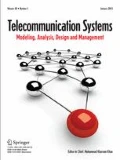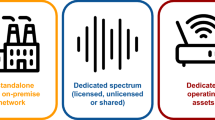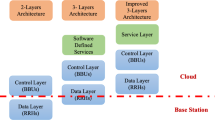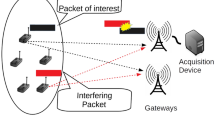Abstract
In this paper, we focus on the Bluetooth wireless network, analyzing its ability to support the Quality of Service (QoS) requirements defined by QoS sensitive applications. The QoS perceived by the application depends on the scheduling mechanisms chosen at the medium access layer. Hence, we propose to evaluate the ability of different Bluetooth scheduling algorithms (1-RR/FIFO, 1-RR/EDF, E-RR/FIFO and E-RR/EDF) to guarantee bounded transmission delays. First, we establish a bound on the worst case response time of any sporadic message using a worst case analysis. We then compare the computed bounds with the worst case response times obtained by simulation for different traffic distributions and show in which configurations our bounds are tight. We finally compare those different schedulings and show how to extend our results on worst case response times taking into account message segmentation.
Similar content being viewed by others
References
A. Capone, M. Gerla and R. Kapoor, Efficient polling schemes for Bluetooth picocells, in: Proceedings of IEEE ICC 2001, Helsinki, Finland, (2001).
A. Das, A. Ghose, A. Razdan and R. Shorey, Enhancing performance of asynchronous data traffic over the Bluetooth wireless ad-hoc network, in: Proceedings of IEEE Infocom 2001 Alaska, USA, (2001).
L. George, N. Rivierre and M. Spuri, Preemptive and non-preemptive real-time uniprocessor scheduling, INRIA Research Report #2966 (1996).
L. George and P. Minet, A FIFO worst case analysis for a hard real-time distributed problem with consistency constraints, in: Proceedings of ICDCS’97 Baltimore, Maryland, USA (1997).
K. Jeffay, D.F. Stanat and C.U. Martel, On non-preemptive scheduling of periodic and sporadic tasks, in: Proceedings of IEEE Real-Time Systems Symposium San-Antonio, Texas (1991).
C.L. Liu and J.W. Layland, Scheduling algorithms for multiprogramming in a hard real-time environment, Journal of ACM (1973) 46–61.
Specifications of the Bluetooth system, Version 2.0. (2000). www.bluetooth.com.
K. Tindell, Holistic schedulability analysis for distributed hard real-time systems, Special issue on embedded real-time systems (1995).
G. Zussman, U. Yechiali and A. Segall, Exact probabilistic analysis of the 1-limited scheduling algorithm for symmetrical Bluetooth piconets, in: M. Conti et al. (eds.) Proceedings of IFIP-TC6 PWC’03 Vol. 2775 of LNCS Springer, (2003).
Author information
Authors and Affiliations
Corresponding author
Rights and permissions
About this article
Cite this article
Mercier, A., Minet, P. & George, L. Worst case response times in a Bluetooth piconet: scheduling combining 1-RR or E-RR with FIFO or EDF. Telecommun Syst 33, 187–213 (2006). https://doi.org/10.1007/s11235-006-9016-y
Published:
Issue Date:
DOI: https://doi.org/10.1007/s11235-006-9016-y




